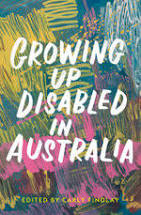Growing Up Disabled in Australia (Black Inc 2021) is the latest in the anthology series depicting diverse experiences of Australian life, this publication edited by Carly Findlay. Featuring some famous names and some less famous but equally compelling storytellers, this book is a frank and informative [JW1] ‘own voices’ memoir compilation of what it means to be labelled as disabled, how that affects people differently, the challenges disability provokes but also the strength and self-confidence people with disabilities often demonstrate in their lives.
I learnt so much from this book, which explores the notion that disabled people often don’t grow up thinking themselves so – that disability is a social construct – ‘the social model sees disability as the result of the interaction between people living with impairments and an environment filled with physical, attitudinal, communication and social barriers … [that] therefore carries the implication that [those environments] must change to enable people living with impairments to participate in society on an equal basis with others.’ I understood better that disabilities are not always visible; that ignorance and discrimination often cause internalised ableism even in people with disabilities; that many people now embrace the label ‘disabled’ as a powerful way to define themselves and to advocate for others; that disability is an intersectional issue (the contributors are disabled but also perhaps chronically ill, mentally ill, neurodiverse, Indigenous, gay, non-binary, older Australians as well as younger people, from the cities and from rural areas, and of all genders, cultures and sexualities).
Some of the included pieces are quite different in form and structure; some are funny, some sad, some frustrated or angry and some poignant. All are written with the complex emotions suffered by young people who grew up knowing they were different, and not always knowing how to deal with that, especially if their society or community around them made it more difficult because of exclusion, ableism, intolerance, impatience, ignorance or a lack of compassion. Some detail years of physical and emotional pain. Some depict circumstances so dire that the only response is admiration and respect. Nobody wants pity. Nobody wants special treatment or greater advantage. All each of the writers asks for is equality – a world in which they are able to navigate despite their disability, and not because of it.
Contributors include disability advocate (and fashion icon!) Carly Findlay, parliamentarian Jordon Steele-John, Jessica Walton, Andy Jackson, Paralympian Isis Holt, Anna Whateley, Astrid Edwards and Carly-Jay Metcalfe.
Some of the disabilities that the contributors to this anthology live with range from skin conditions to mental illness, from Marfan Syndrome to blindness to deafness, congenital muscle disease to autism to Ehlers-Danlos Syndrome, cerebral palsy to nervous system disorders, cystic fibrosis to auto-immune disorders, intellectual disability to fibromyalgia, polio to albinism, chronic fatigue to rare genetic disorders to multiple sclerosis.
One in five Australians has a disability. For some, this is not a problem, except for those who want to ‘fix’ them. For many it means they are always watched or studied. For some, labels are distressing and disempowering, whereas others wear labels proudly and loudly. People with disabilities are – surprise, surprise – just as diverse as the rest of the population. This anthology is an opportunity for their voices to be heard and for them to be represented in current and mainstream literature.

